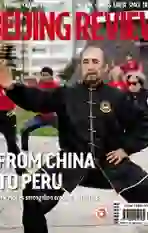The Virtues of Simplicity
2016-12-22ByJiJing
By+Ji+Jing

Qin Yanshi, a retired professor of Sichuan Normal University, has focused on Mo Zi (Micius), a philosopher of the early Warring States Period (475-221 B.C.), throughout his academic career. As a result, he has adopted Mos ideas about simplicity and austerity in his daily life.
Qin recently founded a non-profit organization promoting consumption of less meat and more vegetables. Most of its 200 or so members are academics, business people and housewives. The organization hosts vegetarian meals twice a week, and a portion of the revenue is donated to charity.
Qin said Mos advocacy of simplicity has influenced him in a big way since he first came across the philosopher while studying for a masters degree at Shandong University in the 1980s.
“Mos thought on austerity applies both to the governance of a country and to individualsdaily lives,” Qin said.
“For instance, Mo said one of the seven reasons that contribute to the fall of a country is building luxurious palaces while ignoring the construction of city walls and moats for national defense. He also advocated using trees to build houses without stripping their bark and wearing shoes made of vines and twigs,” Qin added.
Qin attended the Fourth Nishan Forum on World Civilizations recently held in Qufu in Shandong Province, where participants looked to draw inspiration from traditional philosophies to solve present-day ills such as the pollution and ecological damage brought about by modernity.
Qufu is home to the temple, mansion and cemetery of Confucius, the renowned educator and philosopher who lived approximately 2,600 years ago. Confucianism is one of the traditional Chinese philosophical schools. Nishan, a hill 30 km southeast of central Qufu, is the birthplace of Confucius.
The theme of this years forum, which took place from November 16 to 17, was “Traditional Culture and Ecological Progress—Toward a Green and Simple Lifestyle.”
Sources of inspiration
Confucianism contains ideas about simplicity and austerity. According to Confucius, people seldom make mistakes by being frugal.
“Confucianism endorses a simple way of dressing and dining and regards a thrifty lifestyle as a noble pursuit,” said Kong Chenyan, an associate professor at Zhejiang Academy of Chinese Culture in Hangzhou, Zhejiang Province, at the forum.
Simplicity and thrift also feature in philosophy elsewhere in the world. Phoebe Phong Chang, Chair of the Harvard Chinese Culture Workshop, said the idea of simplicity is reflected in the writing of American author and naturalist Henry David Thoreau (1817-62), who recounted in his book Walden the experience of living in a cabin he built in the countryside for around two years.
“Thoreau was able to live a life of self-sufficiency by satisfying only his own basic needs,”Chang said.
Another example of foreigners adopting the simple life comes from American author Helen Nearing (1904-95) and her husband Scott, who co-authored The Good Life: Helen and Scott Nearings Sixty Years of Self-Sufficient Living, according to Chang. The couple abandoned the city for a rural life with just their good health, self-reliant attitude and minimal cash. They constructed dwellings from local stone, farmed their own food and cooked and heated with wood they themselves cut.
Lou Shibo, Vice President of Zhejiang Theological Seminary and also a Christian church minister, told Beijing Review that a number of religions such as Christianity endorse a simple and thrifty life based on and propped up by faith.
Time running out
Consumerism has pushed people to overly exploit natural resources, resulting in serious damage to the ecosystem and the natural environment. Thus, a simple lifestyle has become particularly important in a modern context.
“People are seeking to derive a sense of security and satisfaction through reckless accumulation of material wealth,” Lou said. “Growing consumption has driven excessive exploitation of mineral resources and deforestation, leading to imbalance in the ecosystem and even natural disasters.”
He said its urgent to resort to the philosophies of various civilizations to ease the global ecological crisis and promote a green, environment-friendly and simple lifestyle.
Kong applauded Chinese President Xi Jinpings calls for resource conservation and environmental protection.
Real actions
Kong called for concrete plans for advocating a simple way of life.
“Ancient Chinese philosophers tried to encourage rulers to institutionalize a thrifty way of life in order to popularize it among the people,”he said. “For instance, Xun Kuang, a famous Confucian philosopher living in the late Warring States Period, suggested formulating rules and regulations at the national level to restrain consumption and promote thrift.”
Eco-friendliness, one of the five development concepts put forward in Chinas 13th Five-Year Plan (2016-20), reflects this wisdom with a national strategy aimed at following a sustainable development path, according to participants at the Nishan forum.
Kong said officials should play an exemplary role in leading a simple life. In recent years, the Communist Party of China has launched a series of measures to fight corruption and oppose extravagance. For instance, the Party released its eight-point rule on austerity in late 2012, requiring officials to reduce pomp during visits and meetings and practice thrift.
Chang said in practicing austerity, people should start with themselves. “For example, we should restrain our desire for famous brands when shopping and adhere to a simple diet,”she said.
Lou said people should buy items for their practical use rather than for the purpose of displaying status. He also suggested people donate items that they no longer need to others who could really benefit from them.
Qin said pursuing a diet with less meat has greatly improved his health, and in future, the 66-year-old plans to spread ideas about the simple life to more people.
